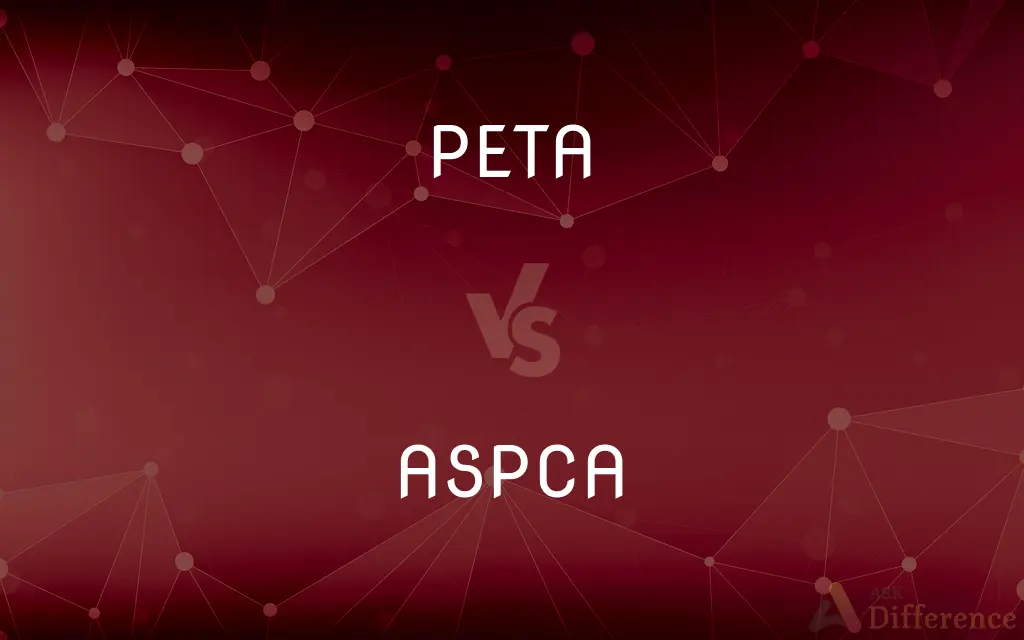PETA vs. ASPCA — What's the Difference?
By Tayyaba Rehman & Fiza Rafique — Published on February 3, 2024
PETA is an animal rights organization advocating against animal cruelty while the ASPCA focuses on preventing animal abuse and providing shelter and adoption services.

Difference Between PETA and ASPCA
Table of Contents
ADVERTISEMENT
Key Differences
PETA, founded in 1980, aggressively campaigns for animal rights, often employing provocative tactics to draw attention to animal cruelty. The ASPCA, established in 1866, is the oldest animal welfare organization, primarily focusing on preventing cruelty through legal advocacy, rescue, and education.
PETA is known for its radical stance, promoting a vegan lifestyle and opposing any form of animal exploitation, including the use of animals for food, clothing, or entertainment. In contrast, the ASPCA works within the framework of the law to improve animal welfare, offering services like adoption and spay/neuter programs.
PETA often engages in direct action and attention-grabbing campaigns to publicize its cause, sometimes leading to controversy. The ASPCA, on the other hand, focuses on building community relationships and public education to prevent animal cruelty and promote pet adoption.
Both PETA and the ASPCA are involved in legislative efforts, but PETA tends to push for more radical changes in laws regarding animal rights, while the ASPCA works to ensure the enforcement of existing animal welfare laws and the enactment of policies that incrementally improve animal welfare.
PETA operates globally, aiming to establish universal animal rights, while the ASPCA's efforts are primarily concentrated in the United States, focusing on local and national legislation and community-based animal welfare programs.
ADVERTISEMENT
Comparison Chart
Acronym Expansion
PETA stands for People for the Ethical Treatment of Animals.
ASPCA stands for American Society for the Prevention of Cruelty to Animals.
Year of Establishment
Founded in 1980.
Established in 1866.
Primary Focus
Advocates for animal rights, promoting a cruelty-free lifestyle.
Focuses on preventing animal cruelty and promoting pet adoption.
Method of Operation
Known for provocative campaigns and direct action.
Operates through legal advocacy, rescue, and education.
Geographical Presence
Operates globally with a universal approach to animal rights.
Primarily active in the United States with a focus on local communities.
Compare with Definitions
PETA
PETA engages in legislative advocacy to establish animal rights.
PETA's lobbying efforts contributed to the new animal welfare bill.
ASPCA
The ASPCA operates shelters and promotes the adoption of homeless pets.
The ASPCA adoption event found homes for over a hundred cats and dogs.
PETA
PETA is an animal rights organization advocating for a cruelty-free lifestyle.
PETA's campaign against fur coats has gained significant attention.
ASPCA
The ASPCA is a nonprofit organization dedicated to preventing animal cruelty.
The ASPCA's rescue team saved dozens of animals from the flood.
PETA
PETA is known for its provocative campaigns to end animal exploitation.
PETA's demonstration at the fashion show caused a media frenzy.
ASPCA
The ASPCA educates the public on responsible pet ownership.
The ASPCA's workshop taught us how to care for our new puppy.
PETA
PETA promotes veganism to combat animal suffering in industries.
PETA distributed vegan starter kits at the health fair.
ASPCA
The ASPCA provides spay/neuter services to control the pet population.
The ASPCA's mobile clinic provided free spaying services in our neighborhood.
PETA
PETA operates globally to spread its animal rights message.
PETA's international conference drew activists from around the world.
ASPCA
The ASPCA advocates for stronger animal protection laws.
The ASPCA's testimony was crucial in passing the new animal safety ordinance.
Common Curiosities
What is PETA?
PETA is an animal rights organization dedicated to advocating for the ethical treatment of animals.
What is PETA's mission?
PETA's mission is to promote the humane treatment of animals and to prevent their suffering.
Does PETA engage in advocacy and activism?
Yes, PETA is known for its advocacy, protests, and campaigns to raise awareness about animal rights issues.
Does PETA have international offices?
Yes, PETA has offices and affiliates in several countries worldwide.
What is the ASPCA?
The ASPCA is a nonprofit organization dedicated to preventing cruelty to animals in the United States.
When was PETA founded?
PETA was founded in 1980.
Does the ASPCA have a role in law enforcement related to animal cruelty?
Yes, the ASPCA assists law enforcement in investigating and prosecuting cases of animal cruelty.
When was the ASPCA founded?
The ASPCA was founded in 1866.
Does the ASPCA operate shelters for animals?
Yes, the ASPCA operates animal shelters and rescue programs.
Is PETA a nonprofit organization?
Yes, PETA is a nonprofit organization.
Is the ASPCA funded solely by donations?
While donations are a significant source of funding, the ASPCA also receives grants and revenue from various sources.
Does PETA support animal testing for medical research?
No, PETA opposes animal testing and advocates for alternatives in scientific research.
What are the key initiatives of the ASPCA?
The ASPCA focuses on animal rescue, adoption, advocacy, and providing resources to prevent cruelty.
Is the ASPCA involved in lobbying for animal welfare legislation?
Yes, the ASPCA is active in advocating for and supporting legislation to protect animals.
Is the ASPCA affiliated with other animal welfare organizations?
Yes, the ASPCA collaborates with other organizations to further their mission.
Share Your Discovery

Previous Comparison
Pitbull vs. American Bulldog
Next Comparison
Christmas vs. KwanzaAuthor Spotlight
Written by
Tayyaba RehmanTayyaba Rehman is a distinguished writer, currently serving as a primary contributor to askdifference.com. As a researcher in semantics and etymology, Tayyaba's passion for the complexity of languages and their distinctions has found a perfect home on the platform. Tayyaba delves into the intricacies of language, distinguishing between commonly confused words and phrases, thereby providing clarity for readers worldwide.
Co-written by
Fiza RafiqueFiza Rafique is a skilled content writer at AskDifference.com, where she meticulously refines and enhances written pieces. Drawing from her vast editorial expertise, Fiza ensures clarity, accuracy, and precision in every article. Passionate about language, she continually seeks to elevate the quality of content for readers worldwide.
















































